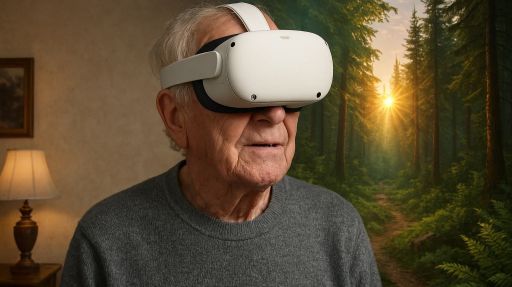
14/04/2025 1:58 pm
Why Reverie VR Is a Smart Dementia Care Investment
Investing in Innovative Dementia Care: Why Reverie VR Makes Financial and Ethical Sense
As the owner of a care home, you're constantly balancing compassionate, quality care with practical financial considerations. Dementia care, while immensely rewarding, can also present significant operational and economic challenges, from staff turnover and training costs to managing residents' behavioural and emotional needs. Embracing innovative technologies such as Reverie VR not only enhances the quality of life for residents but also offers clear financial and ethical benefits for your facility.
Understanding the Economic and Operational Challenges
Managing a care home specialising in dementia requires substantial resources. Costs associated with behavioural interventions, medication, staff retention, and regulatory compliance continually rise. High-quality dementia care demands personalised interventions that traditionally require significant staff time and resources. Care home owners face the challenge of balancing these escalating costs with delivering exceptional, person-centred care.
Why Virtual Reality Matters in Dementia Care
Virtual reality (VR) has emerged as a powerful tool in dementia care, improving the quality of residents' lives by providing gentle, immersive, and therapeutic experiences. Reverie VR specifically offers carefully crafted 360-degree visualisations designed to calm, engage, and uplift individuals with dementia.
The Financial and Ethical Case for Reverie VR
Adopting Reverie VR in your care home is an investment that can yield significant operational savings, ethical improvements, and regulatory advantages:
Reducing Behavioural Management Costs
One of the most substantial benefits of Reverie VR is its potential to reduce reliance on medication and intensive behavioural interventions. By offering calming VR experiences, your facility can proactively manage agitation, anxiety, and depression among residents. This not only reduces distress for residents but can significantly decrease medication usage and related costs.
Supporting Evidence:
A study in Journal of Alzheimer's Disease (2020) found VR interventions reduced agitation and significantly decreased reliance on pharmacological treatments for dementia-related behavioural symptoms (Saredakis et al., 2020 - j-alz.com).
Research by Moyle et al. (2018) in BMC Geriatrics confirmed that VR effectively lowers agitation, thereby reducing associated staff interventions and resource demands (bmcgeriatr.biomedcentral.com).
Enhancing Staff Morale and Retention
Implementing innovative technology like Reverie VR shows your staff that you invest in their ability to deliver exceptional care, leading to improved job satisfaction and reduced turnover. Staff empowered with tools that meaningfully enhance resident wellbeing experience less burnout and higher morale, positively impacting retention and reducing costly staff turnover.
Supporting Evidence:
According to Baños et al. (2013), adopting technology-based interventions positively impacts caregiver satisfaction and retention by reducing emotional strain and workload (home.liebertpub.com).
Achieving Regulatory Excellence
Care homes are subject to rigorous oversight, with increasing expectations for innovative, person-centred dementia care. Investing in Reverie VR demonstrates your facility’s commitment to high-quality, compassionate care, strengthening your regulatory standing.
Supporting Evidence:
Health Innovation Network’s report (2017) highlights VR as a recommended practice to enhance dementia care standards and support regulatory compliance (Health Innovation Network).
Ethical and Person-Centred Care
Beyond financial considerations, Reverie VR embodies your care home's commitment to dignity, compassion, and person-centred care. Providing gentle, immersive experiences not only enhances quality of life for residents but aligns your care approach ethically and morally with the values of empathy and respect.
Implementing Reverie VR Practically
Introducing Reverie VR to your care home is straightforward:
Assess Resident Needs: Identify residents who will benefit most from personalised VR experiences.
Staff Training: Provide staff with comprehensive training on using Reverie VR safely and effectively.
Integrate into Daily Routines: Offer VR experiences regularly to maintain consistent emotional wellbeing and cognitive engagement.
Monitor Impact: Regularly review outcomes and satisfaction to ensure ongoing effectiveness.
Conclusion
Investing in Reverie VR makes compelling sense both ethically and financially. It positions your care home as forward-thinking, compassionate, and committed to the highest standards of dementia care, providing measurable returns through cost reductions, improved staff retention, regulatory compliance, and above all, enhanced resident wellbeing.
Interested in learning more?
To learn more about how Reverie VR can transform your admissions process and improve resident outcomes, please contact our team for a personalised consultation.

14/04/2025 10:34 am
Easing Dementia Care Home Transitions with Reverie VR
Transitioning into a care home is a significant and often stressful event for individuals living with dementia. The unfamiliar environment, new routines, and separation from familiar surroundings can lead to heightened anxiety and emotional distress. As a Care Home Admissions Manager, facilitating a smooth and comforting transition is paramount. Integrating innovative tools like Reverie VR can play a crucial role in easing this process.



Get in touch & book a demo
For more information or to arrange a free demo please get in touch by pressing the button below.
